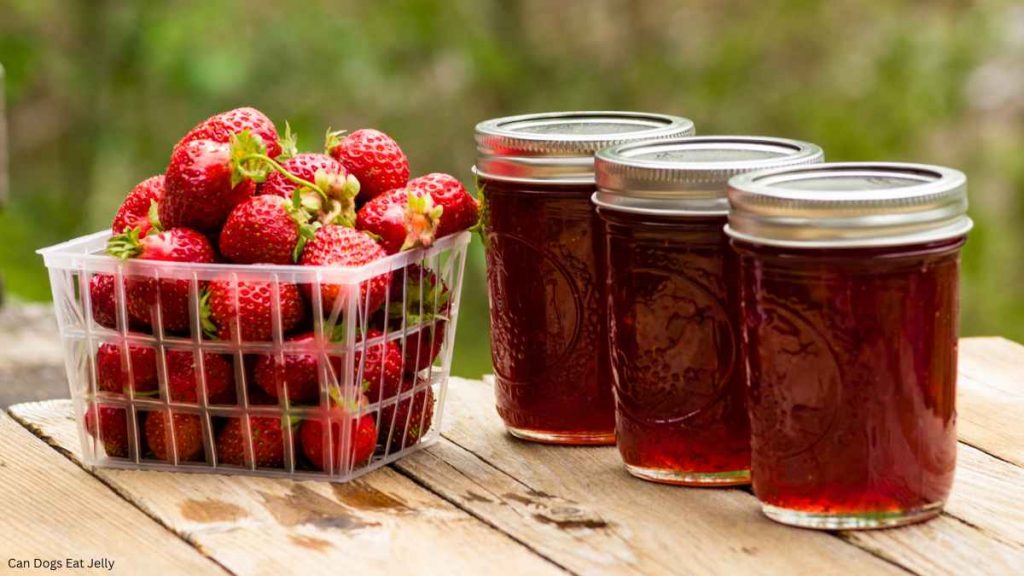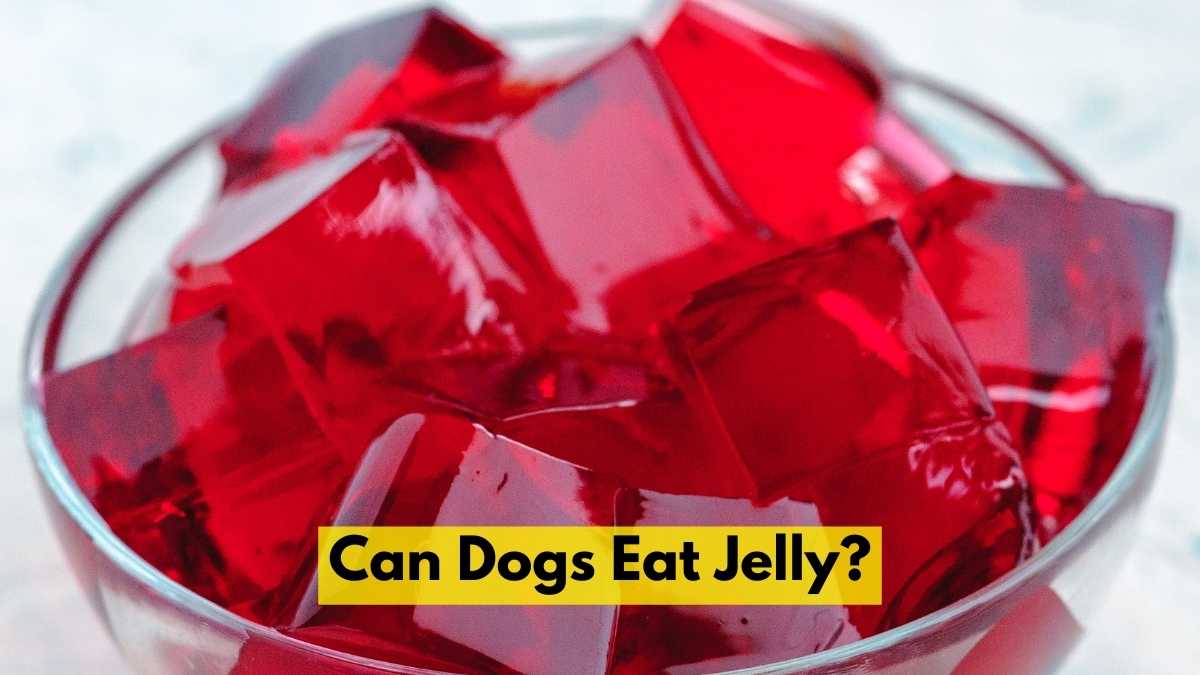Can dogs eat jelly? It’s a question that dog owners may ponder when faced with a tempting jar of this gelatinous treat. Jelly, with its sweet and fruity flavors, is a popular spread or topping enjoyed by many humans. However, when it comes to our furry companions, it’s crucial to consider their unique dietary needs and potential health risks associated with certain foods.
Understanding whether dogs can safely consume jelly is important for responsible pet ownership. As dog owners, we have a responsibility to ensure that we provide our four-legged friends with a balanced and appropriate diet that supports their overall well-being. While dogs are primarily carnivorous, they can occasionally tolerate and even enjoy some plant-based foods. However, not all human foods are safe for dogs, and jelly falls into the category of foods that require closer examination.
In this article, we will explore the topic of dogs and jelly consumption, addressing the potential benefits, risks, and considerations associated with feeding jelly to dogs. We will delve into the ingredients commonly found in jelly and evaluate their potential toxicity to dogs. Additionally, we will discuss the health risks that may arise from dogs consuming jelly and provide guidance on what to do if your dog happens to devour this sticky treat.
To ensure the well-being of our furry friends, it is essential to make informed decisions about their diet and understand the potential implications of feeding them certain foods. So, let’s dive into the fascinating world of dogs and jelly, exploring the question: can dogs eat jelly?
Table of Contents
Is Jelly Good For Dogs?
A. Nutritional value of jelly
When considering whether jelly is good for dogs, it’s important to evaluate its nutritional value. Jelly is primarily composed of sugar, water, and fruit juice or flavorings. However, it generally lacks significant nutritional content that can contribute to a dog’s overall health. While jelly may provide a small amount of hydration due to its high water content, it offers minimal essential nutrients such as proteins, vitamins, and minerals that dogs require for optimal well-being.
B. Potential benefits of jelly for dogs
Although jelly may not be a nutritionally beneficial food for dogs, it can occasionally serve as a source of enjoyment or a special treat. Some pet owners use a small amount of jelly to mask the taste of medication or to entice picky eaters to consume their regular meals. In such cases, it’s crucial to ensure that the jelly is free from any harmful ingredients and fed in moderation.

Jelly Ingredients: Toxic to Dogs?
A. Examination of common jelly ingredients
To determine whether jelly is safe for dogs, it’s necessary to examine its ingredients. Common jelly ingredients include sugar, fruit juice, pectin, citric acid, and various flavorings. These ingredients are generally safe for human consumption, but dogs have different digestive systems and sensitivities.
B. Identification of potentially toxic ingredients
While most of the basic jelly ingredients are not inherently toxic to dogs, certain additives or flavors commonly used in jelly may pose risks. For instance, artificial sweeteners like xylitol can be highly toxic to dogs and may cause severe health issues, including liver failure. It’s crucial to read the labels carefully and avoid jellies that contain any harmful additives or sweeteners.
C. Impact of toxic ingredients on dogs
If a dog consumes jelly containing toxic ingredients, it can lead to a range of adverse effects. These may include gastrointestinal upset, such as diarrhea and vomiting, as well as potential organ damage or even life-threatening conditions. It is essential to be cautious and vigilant about the ingredients present in jelly to protect our furry friends from potential harm.
By understanding the nutritional value of jelly and examining its ingredients for potential toxicity, we can make informed decisions about whether or not to include jelly in our dogs’ diets. It is always advisable to consult with a veterinarian to ensure the safety and well-being of our canine companions.
Is Jelly Bad For Dogs?
A. Negative effects of jelly consumption on dogs
While small amounts of jelly may not cause immediate harm, it’s important to consider the potential negative effects of jelly consumption in dogs. Since jelly is primarily made up of sugar, excessive consumption can contribute to a variety of health issues. Dogs that regularly consume jelly may be at an increased risk of developing obesity, dental problems, and even diabetes. The high sugar content can also lead to fluctuations in blood sugar levels, which can be particularly concerning for dogs with pre-existing health conditions.
B. Potential digestive issues associated with jelly
Jelly can be difficult for dogs to digest properly due to its gelatinous consistency. This can result in gastrointestinal issues such as diarrhea, vomiting, or stomach discomfort. Dogs with sensitive stomachs or those prone to digestive disturbances may be more susceptible to these issues. Additionally, certain dogs may have allergic reactions to specific ingredients in jelly, which can further exacerbate digestive problems.
C. Risks of obesity and weight gain
As mentioned earlier, jelly is high in sugar and lacks significant nutritional value. Regularly feeding jelly to dogs can contribute to weight gain and obesity, which can lead to various health problems such as joint issues, heart disease, and a decreased lifespan. It’s important to remember that dogs have different dietary needs than humans and that foods high in sugar should be avoided or limited in their diet.
What To Do If Dog Eats Jelly
A. Immediate steps to take
If your dog consumes jelly, it’s important to take immediate action. Firstly, assess the quantity of jelly ingested and check the ingredient list for any potentially toxic additives or sweeteners. If the jelly contains xylitol or any other harmful ingredient, contact your veterinarian or a pet poison helpline immediately.
B. Monitoring the dog for symptoms
Keep a close eye on your dog for any signs of digestive upset or allergic reactions. These may include vomiting, diarrhea, excessive drooling, abdominal discomfort, or changes in behavior. If you notice any concerning symptoms, consult your veterinarian for guidance on how to proceed.
C. When to seek veterinary assistance
In certain cases, jelly consumption may lead to severe symptoms or complications. If your dog exhibits severe vomiting, diarrhea, difficulty breathing, tremors, or collapses, seek veterinary assistance without delay. These symptoms could indicate a more serious condition or potential poisoning, requiring immediate medical attention.
By taking prompt action, monitoring your dog for symptoms, and seeking veterinary assistance when necessary, you can help mitigate any potential risks associated with jelly consumption and ensure your dog’s well-being. It’s always better to err on the side of caution and consult a veterinarian if you have any concerns about your dog’s health after consuming jelly.
Jelly Health Risks
A. Allergic reactions to jelly
Some dogs may be allergic to certain ingredients found in jelly. Common allergens in jelly can include fruits, additives, or preservatives. Signs of an allergic reaction may include itching, skin rashes, hives, swelling, or gastrointestinal disturbances. If you suspect your dog has an allergy to jelly, it is advisable to avoid feeding it and consult with a veterinarian for further guidance.
B. Risk of gastrointestinal upset
The gelatinous texture of jelly, combined with its high sugar content, can lead to digestive issues in dogs. Consumption of large amounts of jelly or frequent indulgence can cause stomach upset, diarrhea, and vomiting. Dogs with sensitive stomachs or those prone to gastrointestinal disturbances may be more susceptible. It’s important to introduce jelly gradually and monitor your dog’s response to ensure it agrees with their digestive system.
C. Potential hazards of artificial sweeteners in jelly
Certain jellies may contain artificial sweeteners, such as xylitol, which can be highly toxic to dogs. Xylitol can cause a rapid release of insulin, leading to a dangerous drop in blood sugar levels and potential liver damage. It is crucial to read ingredient labels carefully and avoid any jelly products that contain artificial sweeteners or other harmful additives.
Can Dogs Have Jelly?
A. Considerations for feeding jelly to dogs
Feeding jelly to dogs should be approached with caution and consideration. It is not a necessary or nutritionally essential component of a dog’s diet. Before introducing jelly, consider your dog’s overall health, dietary needs, and any potential sensitivities or allergies. Consult with your veterinarian to determine if jelly is suitable for your dog’s specific circumstances.
B. Moderation and portion control
If you choose to offer jelly to your dog as an occasional treat, it should be done in moderation and with careful portion control. Limit the amount of jelly given to prevent excessive sugar intake and potential digestive issues. Remember that jelly should never replace a balanced and appropriate diet tailored to meet your dog’s nutritional requirements.
C. Recommended alternatives to jelly
While jelly may not be the healthiest choice for dogs, there are alternative options that can provide similar enjoyment without the potential risks. Fresh fruits like sliced apples, watermelon, or berries can be a healthier and safer alternative, as long as they are safe for dogs and given in appropriate portions. Always remove any seeds, pits, or potentially toxic parts of the fruits before offering them to your dog.
By understanding the potential health risks associated with jelly consumption, considering individual factors such as allergies or sensitivities, practicing moderation, and exploring healthier alternatives, you can make more informed decisions about whether to include jelly in your dog’s diet. Your veterinarian can provide personalized guidance based on your dog’s specific needs and dietary requirements.
Are Dogs Allergic to Jelly?
A. Common jelly ingredients that may cause allergies
While jelly allergies in dogs are not as common as other food allergies, certain ingredients found in jelly can trigger allergic reactions. Common allergens in jelly can include fruits like strawberries or citrus, additives such as food colorings or preservatives, or even artificial flavorings. It’s important to be aware of these potential allergens and monitor your dog for any adverse reactions.
B. Symptoms of jelly allergies in dogs
Symptoms of jelly allergies in dogs can vary and may include itching, redness or inflammation of the skin, hives, ear infections, gastrointestinal disturbances like vomiting or diarrhea, or respiratory issues such as coughing or wheezing. If you notice any of these symptoms after your dog consumes jelly, it’s advisable to discontinue feeding it and consult with a veterinarian.
C. Consultation with a veterinarian for allergies
If you suspect your dog has an allergy to jelly or any specific ingredient in it, it’s important to seek veterinary guidance. A veterinarian can help diagnose the allergy through proper testing and provide appropriate recommendations for managing your dog’s diet. They may suggest allergy testing or an elimination diet to identify the specific allergen and advice on suitable alternatives or treatment options.

Can Puppies Eat Jelly?
A. Special considerations for feeding jelly to puppies
Feeding jelly to puppies requires extra caution and consideration. Puppies have delicate digestive systems that are still developing, and their nutritional needs differ from adult dogs. While small amounts of jelly may not be harmful, it is generally not recommended as a regular part of a puppy’s diet. Puppies should primarily be fed a balanced, age-appropriate puppy food recommended by veterinarians.
B. Potential impact on puppy development
Feeding excessive amounts of jelly to puppies can lead to nutritional imbalances and contribute to improper growth or weight gain. Puppies require a nutrient-dense diet to support their rapid growth and development. Jelly lacks essential nutrients such as proteins, vitamins, and minerals that are crucial for their proper development. Therefore, it’s best to focus on providing appropriate puppy food that meets their specific nutritional requirements.
C. Age-appropriate alternatives to jelly for puppies
Instead of feeding jelly to puppies, it’s advisable to offer them suitable alternatives that promote their health and growth. High-quality puppy treats designed specifically for puppies can be given as occasional rewards or training incentives. Additionally, small amounts of fresh fruits like banana or cooked vegetables can be offered as healthy, puppy-friendly snacks. However, it’s important to introduce new foods gradually and consult with your veterinarian to ensure they are safe for your puppy.
By being aware of potential jelly allergies in dogs, monitoring for symptoms, and consulting with a veterinarian for proper diagnosis and management, you can ensure your dog’s well-being. When it comes to puppies, prioritizing their specific nutritional needs and offering age-appropriate alternatives will contribute to their healthy development.
FAQ
A. Can Dogs Eat Strawberry Jelly?
Dogs can eat small amounts of strawberry jelly as an occasional treat, as long as it does not contain any harmful additives or sweeteners. However, it is important to monitor for any allergic reactions or digestive upset.
B. Can Dogs Eat Grape Jelly?
Grape jelly should be avoided for dogs. Grapes and raisins can be toxic to dogs and can cause kidney damage. It’s best to err on the side of caution and avoid feeding grape jelly to your dog.
C. Can Dogs Eat Cranberry Jelly?
Cranberry jelly is generally safe for dogs in small amounts, as long as it does not contain any harmful additives. However, it is important to avoid cranberry sauce or jelly with high sugar content, as excessive sugar intake can lead to health issues.
D. Can Dogs Eat Raspberry Jelly?
Raspberry jelly, in moderation and without any harmful ingredients, is typically safe for dogs. However, it is important to watch for any allergic reactions or digestive disturbances, as dogs can be sensitive to certain fruits.
E. Can Dogs Eat Peanut Butter & Jelly?
Peanut butter is generally safe for dogs and can be a tasty treat. However, jelly should be given in moderation and without any harmful ingredients. Ensure the peanut butter does not contain xylitol, as it is toxic to dogs.
F. Can Dogs Eat Jelly Babies?
Jelly babies, which are a type of candy, should not be given to dogs. They contain high amounts of sugar and potentially harmful ingredients. Feeding jelly babies to dogs can lead to digestive issues, obesity, or other health problems. It’s best to avoid giving them to your furry friend.
Conclusion
In conclusion, the question of whether dogs can eat jelly requires careful consideration. While small amounts of jelly may not be immediately harmful, it is important to be aware of the potential risks and drawbacks associated with jelly consumption for dogs.
We examined the nutritional value of jelly and found that it lacks essential nutrients needed for a dog’s overall health. Excessive consumption of jelly can lead to digestive issues, such as upset stomach, diarrhea, and vomiting. Moreover, the high sugar content in jelly poses a risk of obesity, dental problems, and even diabetes in dogs.
Certain ingredients found in jelly, such as artificial sweeteners like xylitol, can be highly toxic to dogs. Therefore, it is crucial to read labels carefully and avoid jellies containing any harmful additives or sweeteners. Allergies to jelly can also occur in dogs, with common allergens including fruits, additives, or preservatives. Monitoring for allergic reactions and seeking veterinary assistance if needed is important.
When considering feeding jelly to dogs, it is recommended to exercise caution. It should be given in moderation, if at all, and with careful portion control. However, it is important to note that jelly is not a necessary or nutritionally beneficial component of a dog’s diet. There are healthier alternatives available, such as fresh fruits or specially formulated dog treats, that can provide enjoyment without the potential risks.
In summary, while dogs can consume small amounts of jelly on rare occasions, it is best to prioritize their overall health and well-being by focusing on a balanced, species-appropriate diet. Consulting with a veterinarian for personalized guidance is always advisable to ensure the dietary choices for your dog are safe and suitable.
You May Also Like:
Can Dogs Eat Oatmeal Cream Pies? Find Out Here


1 thought on “Can Dogs Eat Jelly? Find Out Here”